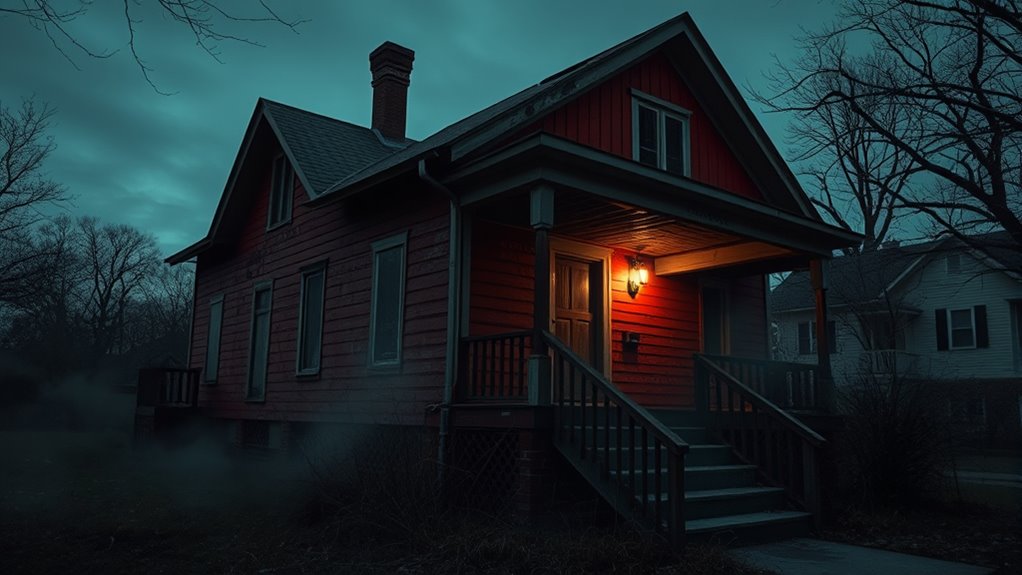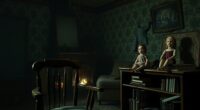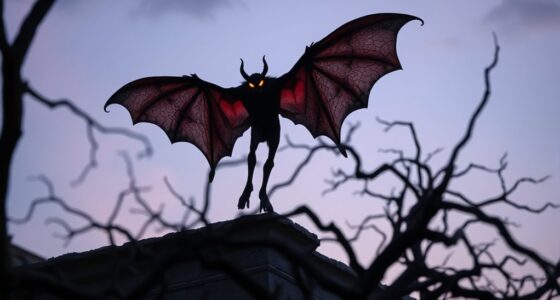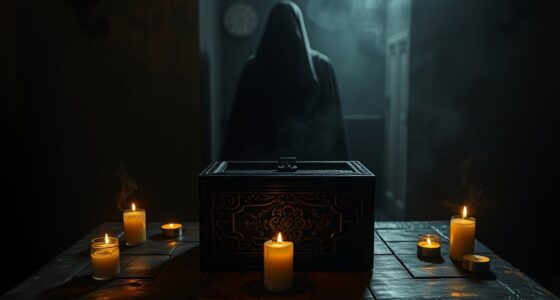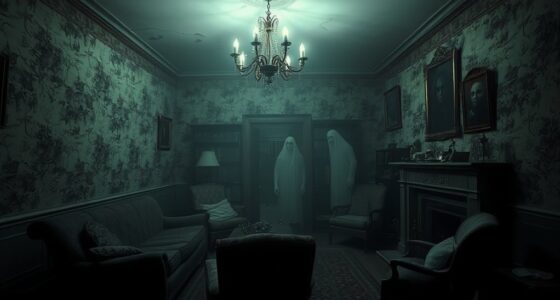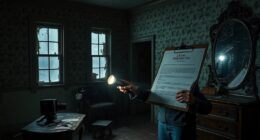The story of the Amityville Horror mixes claims of paranormal activity with media-driven sensationalism. Investigations have reported strange noises and unexplained movements, but skeptics argue many findings are subjective or influenced by environmental factors. Media portrayals, especially the famous 1979 film, have vastly exaggerated the story, blurring the line between fact and fiction. If you want to uncover the truth behind the house’s reputation, there’s more to explore below.
Key Takeaways
- Investigations report strange noises and sensations, but critics cite confirmation bias and environmental factors as explanations.
- Media portrayals and Hollywood adaptations have sensationalized the story, blurring fact and fiction.
- Some family members have admitted to fabricating or exaggerating details of the paranormal claims.
- The house’s haunted reputation is largely driven by media influence and cultural storytelling rather than verified evidence.
- The legend persists as a cultural symbol, shaped more by folklore and media than confirmed paranormal activity.
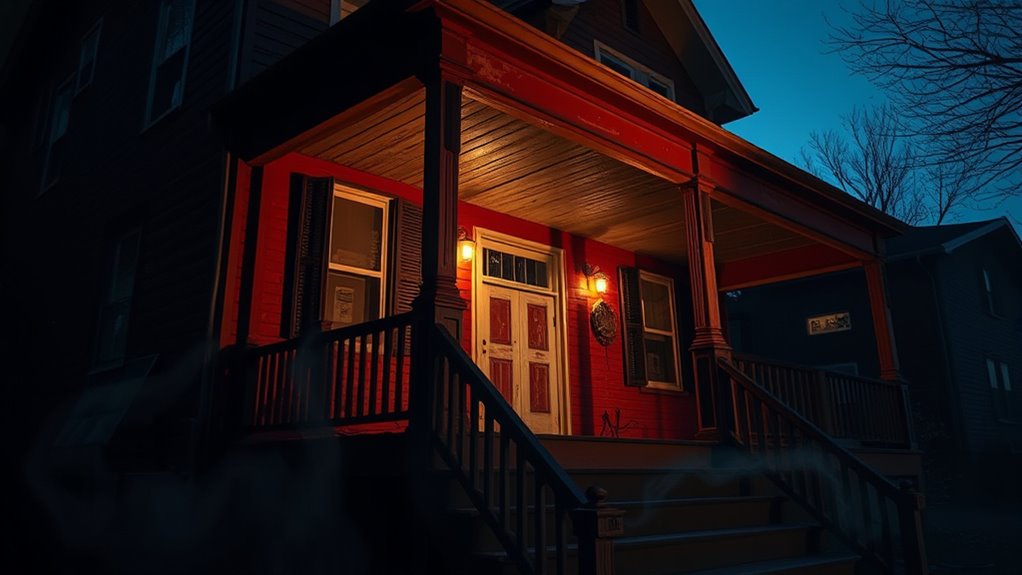
Have you ever wondered whether haunted houses are just stories or if some places truly harbor dark forces? The Amityville Horror is one of the most famous cases that blurs the line between fact and fiction, enthralling imaginations worldwide. To understand the truth behind the legend, you need to look at how paranormal investigations have approached the house and how media portrayals have shaped its reputation. Many skeptics argue that the entire story is a fabrication, fueled by sensational media coverage, while others believe there’s something genuinely sinister about the house.
Is the Amityville Horror fact or fiction? Explore the mysteries behind this infamous haunted house.
When you explore paranormal investigations, you’ll find that numerous teams have visited the Amityville property over the years. Some report strange noises, unexplained movements, and a sense of overwhelming dread, which they interpret as signs of supernatural activity. These investigators often rely on electronic voice phenomena (EVP), thermal imaging, and other tools to detect energy they say can’t be explained by normal science. However, critics argue that many of these investigations are subjective, with confirmation bias playing a significant role. They suggest that some investigators may interpret ordinary house noises or environmental factors as paranormal, especially given the house’s infamous reputation. Additionally, some studies indicate that investigative bias can influence how paranormal encounters are perceived and reported.
Media portrayals have played a huge role in creating and perpetuating the house’s haunted image. From books to movies, the story of the Lutz family’s alleged terrifying experiences has been sensationalized, often exaggerating or inventing details to heighten the horror. Films like the 1979 “The Amityville Horror” turned the story into a blockbuster, fueling public fascination with the supernatural elements. But these portrayals often blur the line between truth and fiction, making it hard to separate fact from Hollywood fiction. The media’s role in sensationalizing the case has led many to believe that dark forces are at work, even in the absence of concrete evidence. Interestingly, some researchers argue that the house’s reputation has been largely shaped by media sensationalism and storytelling, rather than verified events.
You might find it revealing that the Lutz family’s original claims have been challenged, with some family members admitting to fabricating or exaggerating certain details under the influence of media hype. Despite this, the house remains a cultural icon, symbolizing the mystery and fear surrounding paranormal activity. Whether you believe the house is truly haunted or just a product of media-driven folklore, one thing’s clear: the story continues to fascinate because it taps into our deepest fears and curiosity about the unknown. The debate over fact versus fiction persists, making the Amityville house a lasting symbol of the mysterious and the unexplained. This ongoing controversy highlights how media influence can shape public perceptions of paranormal phenomena even without concrete proof.
Frequently Asked Questions
Were Any Real Murders Linked to the Amityville House?
You might wonder if real murders are linked to the Amityville house. According to historical records, a tragic murder occurred there in 1974, when Ronald DeFeo Jr. shot six family members. However, some claim property disputes and local legends fueled the house’s haunted reputation. While the murders are factual, the supernatural stories are debated, and the house’s dark history remains intertwined with its infamous reputation.
Did the Lutz Family Experience Actual Supernatural Events?
Like a shadow lurking in the night, the Lutz family’s claims of supernatural events keep you guessing. While some see their experiences as genuine, paranormal skepticism raises questions about factual discrepancies in their story. You might wonder if they truly encountered spirits or if the tales were exaggerated. Ultimately, whether real or fabricated, their story has become a haunting legend that continues to captivate and divide audiences.
Are There Any Legal Battles Surrounding the House’S Ownership?
You should know that there have been legal disputes and ownership conflicts surrounding the house. Over the years, different parties have fought for ownership rights, leading to lawsuits and legal battles. These legal disputes often involve questions about the house’s history and claims made by previous owners. If you’re interested, you’ll find that these conflicts add an intriguing layer to the house’s mysterious reputation, fueling ongoing curiosity and speculation.
How Much of the Story Was Intentionally Fabricated for Entertainment?
You might wonder how much of the story was intentionally fabricated for entertainment. Many believe that the sensationalized accounts and hoax allegations contributed to exaggerating the events. While some details were likely added to boost interest and sales, others argue that the core experiences remain genuine. Ultimately, the line between truth and fiction blurs, making it tough to determine how much of the story was manipulated for entertainment purposes.
Has the House Been Investigated by Paranormal Experts?
You might wonder if the house has been investigated by paranormal experts. Indeed, numerous paranormal investigations and expert analyses have taken place over the years, aiming to determine if supernatural activity exists there. While some claim evidence of paranormal phenomena, skeptics argue these investigations often lack conclusive proof. Regardless, the house remains a popular subject for paranormal enthusiasts, fueling ongoing debates about the legitimacy of its haunted reputation.
Conclusion
As you close the book on the Amityville Horror, ask yourself—what’s real and what’s just a story? The line between fact and fiction blurs, leaving you wondering if the house truly holds dark secrets or if it’s all just a haunting illusion. Will you ever know the truth? Or is some part of the terror meant to stay forever locked in the shadows, waiting to reveal itself when you least expect it?
